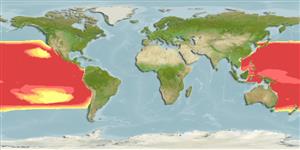>
Lophiiformes (Anglerfishes) >
Linophrynidae (Leftvents)
Etymology: Linophryne: Greek, 'linon' = flax or anything made of flax such as "cord," "rope," or a "net" + Greek, 'phryne' = "toad" (refers to a toadlike fish that fishes with a net) (Ref. 86949).
Environment: milieu / climate zone / depth range / distribution range
पारिस्थितिकी
समुद्री बैथीपिलाजिक; गहराई सीमा 150 - 2000 m (Ref. 86949). Deep-water
Indo-Pacific.
आकार / वज़न / Age
Maturity: Lm ? range ? - ? cm
Max length : 4.3 cm SL पुल्लिंग / अलिंग; (Ref. 27311)
Metamorphosed females distinguished by the following characteristics: escal bulb with distal pair of fringed anterior filaments; medial distal papilla with short filaments present; one or two pairs of stout distal posterior filaments; simple tapering appendage emerging from behind escal pore; barbel with short, stout, undivided stem, length 10-17% SL to base of series of 5-6 short branches, each with a number of branched filaments at distal tip; filaments and transparent distal part of primary branches with numerous, small, globular luminous organs, internal, sessile, or set on short stalks; lower jaw without symphisial spine. Males without pointed sphenotic spines. Larvae, males and juvenile female with two lateral rows of large subdermal melanophores along side of body, with concentration at base of caudal fin (Ref. 86949).
Also mesopelagic (Ref. 7300).
Life cycle and mating behavior
परिपक्व अवधि | पुनरुत्पत्ति | मछलीऔ का अंडे देना | अंडे | Fecundity | लार्वा
Paxton, J.R., D.F. Hoese, G.R. Allen and J.E. Hanley, 1989. Pisces. Petromyzontidae to Carangidae. Zoological Catalogue of Australia, Vol. 7. Australian Government Publishing Service, Canberra, 665 p. (Ref. 7300)
IUCN Red List Status (Ref. 130435)
Threat to humans
Harmless
Human uses
अधिक जानकारी
आम नामउपशब्दचपायचयपरभक्षीईकोटोकसीकोलौजीपुनरुत्पत्तिपरिपक्व अवधिमछलीऔ का अंडे देनाSpawning aggregationFecundityअंडेEgg development
संदर्भजलीयकृषिजलीयकृषि रूपरेखाखींचआनुवंशिकीElectrophoresesहैरेटिबिलटीबीमारीप्रक्रमणNutrientsMass conversion
सहयोगीयोतस्वीरेStamps, Coins Misc.ध्वनिसिगुयटिरारफ्तारतैरने के प्रकारगिल क्षेत्रOtolithsदिमागदृष्टि
साधन
Special reports
Download XML
इंटरनेट स्रोत
Estimates based on models
Preferred temperature (Ref.
123201): 4.2 - 11.1, mean 6.7 °C (based on 507 cells).
Phylogenetic diversity index (Ref.
82804): PD
50 = 0.5000 [Uniqueness, from 0.5 = low to 2.0 = high].
Bayesian length-weight: a=0.01000 (0.00244 - 0.04107), b=3.04 (2.81 - 3.27), in cm total length, based on all LWR estimates for this body shape (Ref.
93245).
Trophic level (Ref.
69278): 3.4 ±0.6 se; based on size and trophs of closest relatives
Fishing Vulnerability (Ref.
59153): Low vulnerability (10 of 100).
